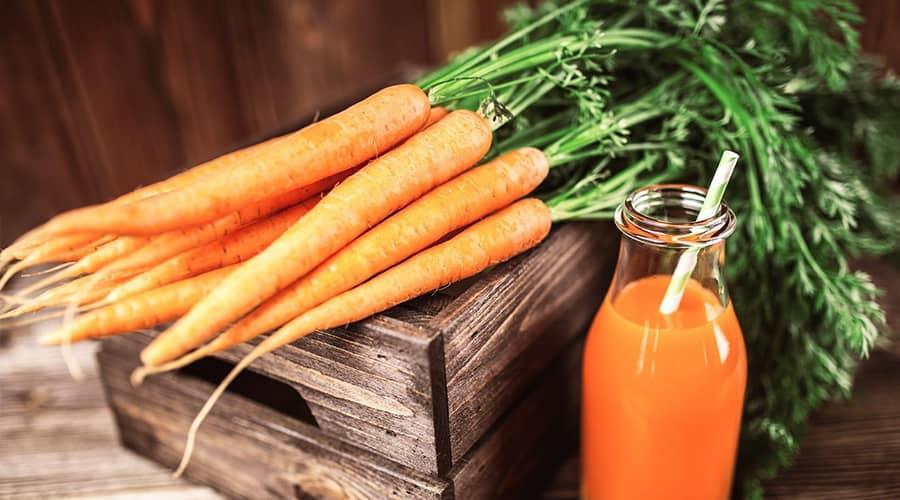
Carrots have long existed in white, yellow and purple varieties, with the orange colour we know today being the work of Dutch gardeners.
It is very rich in nutrients, including vitamins B1, B2, B6 and C, and contains calcium, phosphorus and iron minerals. It contains about 7-15 mg of beta-carotene, the provitamin of vitamin A, and an average of 6-7 grams of carbohydrates per 100 grams.
Weak, fresh carrots do not need to be peeled, and the rest only thinly, as most of their valuable nutrients are found just under the thin outer skin.
Carrots are a type of vegetable whose beneficial nutrients are not really effective when eaten raw, only about a quarter of them being used in this form. However, when exposed to heat (i.e. cooking or frying), the thick cell walls open up, making a significant proportion of the beneficial substances available.
Let’s look at the benefits of carrots.
Its regular consumption helps to maintain the skin’s water content, plays a role in regulating sebum and sweat glands, and its beta-carotene content protects against sunburn. A huge advantage of carrots is that they are available all year round. Recommended in immune-boosting cures, some experts even suggest it can protect against some cancers. It is particularly important in preventing diseases of the heart and circulatory system.
Research shows that eating a large carrot a day can significantly reduce blood cholesterol levels within a few weeks.
But be careful, because this plant tends to store nitrates in soil or fertilisers, so you need to get it from a safe, chemical-free source.
Carrot leaves also have a lot of nutrients in them, so it’s not worth throwing them away.
Despite the bitter taste of carrot leaves, they are extremely good for your health.
The leaves have an antiseptic effect. It helps to disinfect wounds, but it can also be used to make mouthwashes, which help to keep the mouth hygienic and eliminate bad breath.
Carrot leaves are very rich in chlorophyll. Cleanses the blood and increases the production of red blood cells, as well as having a beneficial effect on the lymphatic system.
It has more vitamins and minerals than the root. High in vitamins K and C and also contains many minerals (potassium, magnesium, calcium). It has much more vitamin K than any other vegetable. Vitamin K also promotes blood clotting and wound healing. In terms of vitamin C, it has about six times more in its leaves than its roots.
It is very good for the kidneys. It can help prevent the development of kidney stones, but it can also help dissolve kidney stones that have already formed.
Carrots are also great for the stomach and digestion. Carrot leaves are very rich in fibre, and the fibre helps digestion.
It can also be used for migraines and headaches. Most migraines are caused by a vitamin deficiency and as carrot leaves are full of vitamins, they can help relieve the symptoms.
Raw carrots are much better than cooked or steamed versions.
Cooked beetroot is also excellent, but some nutrients are lost when cooking or steaming food in the heat. Raw carrots, on the other hand, contain all the natural enzymes that help them absorb nutrients better.
Raw carrots are also lower in calories than the cooked or steamed versions.
The effects of carrot juice are the same as those of carrots, so it is very healthy and recommended to consume it in a drink or even in a smoothie.
We cannot overlook the effects of carrots on the liver.
The effect of carrots on the liver has been shown to be beneficial in a number of ways, despite not necessarily having a direct effect on liver function.
Antioxidants: carrots contain antioxidants, such as beta-carotene, which can help protect cells from oxidative stress. Oxidative stress can contribute to liver damage, so antioxidants may be important in supporting liver health.
Vitamins and minerals: Carrots are rich in many vitamins and minerals, such as vitamin A, vitamin C, vitamin K, as well as potassium and fibre. In general, these nutrients can be important for a healthy body.
Fibre: High fibre in carrots can aid digestion and help regulate cholesterol levels. This may be important for supporting cardiovascular health, which may also indirectly affect liver health. However, because of its fibre content, carrots can also have an effect on stool, or more specifically, loosening it.



